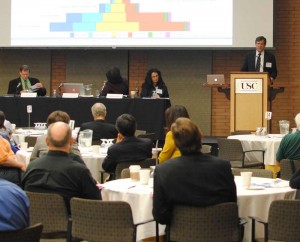USC STEM discusses new studies
As part of an initiation to increase research and development in science, technology, engineering and mathematics fields to expand interdisciplinary opportunities across different schools, faculty and students have launched the USC STEM Consortium.

Science · Michael Kassner, director of the Office of Naval Research (Discovery & Invention) spoke at the USC STEM Consortium kick-off. - Engie Salama | Daily Trojan
The consortium, an initiative headed by faculty at the USC Rossier School of Education and Viterbi School of Engineering to expand STEM research and education from pre-kindergarten through employment, kicked off Monday
“Our goal is to improve the workforce in STEM in the [United States],” said Gisele Ragusa, co-organizer of the STEM Education Pipeline Consortium and USC professor of education and engineering. “The way to do that we have to start with K-12 and continue in U.S. education.”
John Brooks Slaughter, professor of engineering and education, said the new consortium will directly affect USC students by providing them with more research opportunities.
“It should provide more opportunities to benefit undergraduate and graduate research,” Slaughter said. “Our goal is to demonstrate to faculty members and researchers the benefits of emerging opportunities.”
The consortium is comprised of USC faculty members involved with research in multiple disciplines, including history, cinematic arts and medicine.
The kick-off event focused on interdisciplinary opportunities in STEM fields, and ways to improve education in STEM subjects and in critical thinking in those fields.
Representatives from companies, such as Boeing and Toyota, discussed certain programs corporations fund at universities. Representatives from federally funded research programs presented on sources of federal funds.
Peter Rivera, a program officer at the California Community Foundation, a Los Angeles-based advocacy group, discussed the process and evaluation of proposals.
“It was a good opportunity to see what [reviewers] see,” Rivera said. “We’ll definitely keep up-to-date with what’s going on with the consortium.”
The kick-off is intended as a starting point for many future projects, Ragusa said.
“In the university, it will enable students across the college to work together,” Ragusa said. “And we will have our neighbors work with us to inform the future of science education.”
Ximena Velazquez-Arenas, a junior majoring in international relations, said an increased emphasis on interdisciplinary studies is pertinent to the success of USC students.
“When I first came to USC, I remember President [C. L. Max] Nikias saying that we were free to find the ‘Renaissance scholar,’ and interdisciplinary studies is necessary for any liberal arts school to make more well-rounded students,” Velazquez-Arenas said.
The consortium has received funding from the USC Research Collaboration Fund, which provides funding for interdisciplinary research, and USC’s Provost Office. The funding is intended to last for three years.
